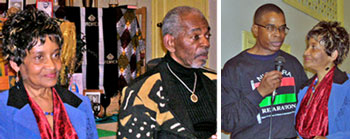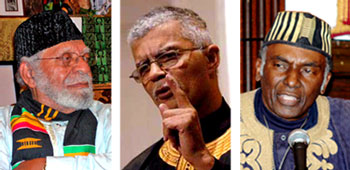ASKIAM
Senior Correspondent
The N’COBRA Reparations Movement commemorates its 20th anniversary
- Restitution: Historic victory in corporate reparations lawsuit (FCN, 01-03-2007)
- Ndaba: ‘A great sitting-down’ (FCN, 08-09-2003)
- The Movement for Reparations (Minister Farrakhan/FCN, 08-16-2002)
- Ten Reasons: A Response to David Horowitz’s Rant on Reparations (UMASS.edu)

WASHINGTON (FinalCall.com) – Themed “Educating, mobilizing and organizing for Black reparations,” the movement for reparations for the victims of the trans-Atlantic Slave Trade commemorated a milestone with more militant action and celebrations Oct. 26-27 during the 20th Anniversary Commemoration of N’COBRA–the National Coalition of Blacks for Reparations in America.
Protestors demonstrated for three hours in front of Wachovia Bank branches, demanding that the bank “divest for reparations.” Although the name of the bank is new as a result of mergers and acquisitions, its institutional history is old, N’COBRA leaders reminded their supporters. “Wachovia’s wealth is built on the African Holocaust Enslavement,” the group said in a statement.
N’COBRA founders and legends of the Black militant struggle for the last 50 years, including Dr. Imari Obadele; Hannibal Afrik; Rep. John Conyers (D-Mich.) sponsor of H.R. 40, a bill to establish a U.S. Reparations Study Commission; Detroit City Council member JoAnn Watson; Dr. Leonard Jeffries; 91-year-old former Ambassador Dudley Thompson; attorney Chokwe Lumumba; Dorothy Lewis, N’COBRA founding Chairperson; attorney Adjoa Ayitero; as well as members from Los Angeles, Atlanta, Indianapolis, Ind., New York, Chicago, and Austin, Texas.
Participants were reminded by Wautella Graham, Washington, D.C. co-chair of the anniversary commemoration, that one of the first modern claims for reparations and land for Black descendants of slaves came from the Most Honorable Elijah Muhammad who raised that call during his address at Washington’s Uline Arena, in May 1959.

“We are not only standing on the shoulders of our ancestors, we are predictors of tomorrow,” Hannibal Afrik, past National Chair of N’COBRA continued at the rally Oct. 26. “We control in our minds, the destiny of our people. We are coming together, over and over in small and large places to continue the struggle.
“We want our youth to realize that youth make the revolution, and it is our responsibility as elders to transfer the leadership to those who come behind us. We must first prepare them to accept that responsibility,” Mr. Afrik, a retired Chicago schoolteacher, now living and working near Jackson, Miss. told the crowd.
“That’s why we have to have educational institutions that provide the foundation, social, philosophical and spiritual foundation for our struggle. We pledge our energy and our lives to ensure that our children and our children’s children will not have to suffer the indignity that we have seen.”
The legal basis for reparations is very strong, N’COBRA members insist, despite the fact that there were laws in the United States and Europe legalizing slavery. Such inhumane laws were not enough justification for its operation. Throughout history, other nationalities and indigenous people who have experienced oppression, have received reparation for treatment, which does not equal the suffering of Blacks who were taken from Africa.
Legal scholars and activists pursuing reparations claims in the courts cite the payments made to the Jews by Germany after World War II and the payments made by the United States to Japan following the destruction caused by the unleashing of atomic bombs on that country during, as well as to Japanese Americans who were interred in this country and whose property was illegally seized by the U.S. government.
They insist that the notion that slavery is too long past for compensation, is unacceptable, and they insist that an apology is not enough for the sins of slavery, as its dehumanizing effects are still impacting the lives of many Black people, even though slavery was abolished more than a century ago.
“Don’t let anybody tell you slavery is over,” said N’COBRA co-founder Dorothy Lewis. “There is no statute of limitations if something is still going on. We need to deal with that lie. Slavery, in terms of the White criminal supremacy, is just one arm of the octopus. You’ve got imperialism, colonialism, racism, the prison industrial complex.
“The reparations movement is mobilized to oppose the White, criminal, conspiracy–mobilized crime. People want to tell us about international law, for us to accept it like it’s a done deal. It is up to us to expose the lies, to expose the tactics intended to keep us nailed to the ground and to make us think we are someone who we are not,” she continued.
“We have an identity crisis, worldwide. Part of our reparations is reclaiming our minds, reclaiming our soul, our spirit, gaining an understanding of our whole experience. What we do today, is to create the world that we want to have.
“I had somebody call me and ask, ‘Would scholarships be okay? Would money be okay?’ I’m saying, if you’re in a disaster, you’ve lost everything, whatever is wrong needs to be fixed. All of that is reparations. It’s all of that, from A to Z.”
Many participants in the N’COBRA 20th anniversary commemoration agree. “Some people say the ‘statute of limitations’ has run out,” said attorney Chokwe Lumumba. “We’re seeking reparations for abuse. We’re seeking reparations for abuse as a nation of people. Our statute of limitations has not run out. The statute of liberation is running right now at this very moment today.
“We’re seeking reparations for the abuses that came to our people. They don’t start with slavery. They start when they snatched the first Africans off the continent and invaded the continent of Africa. We’re seeking war reparations because we’re war victims,” said Mr. Lumumba.
The slave-trade is responsible for the poor economic conditions existing in many countries where Black people form the majority of the population on the African continent and in the Caribbean, according to reparations activists. Those countries have been made poor by the plundering of their resources and the dehumanization of their people. The Danish, the Swiss, the Portuguese, the French, as well as the British and Americans must be held accountable for their role in the slave-trade, and for the untold wealth they accumulated using stolen slave labor, N’COBRA speakers argued.
The total economic impact of slavery still lingers in Africa, the richest continent in the world, according to Dr. Leonard Jeffries, professor of African and African American history at the City College of New York.
Ironically, with all its mineral wealth, the entire economy of all 53 African nations totals $550 billion per year, he said, while Blacks in the U.S. alone, have an annual disposable income approaching $900 billion.
“We have to wake up African men and women in these United States, you have more disposable income than the whole African continent, with all the diamonds and gold and uranium,” Dr. Jeffries said. “Once we know our history, reparations becomes an easy lesson for us to learn. It becomes a sacred mission that we have to become involved in, and we need everyone involved, all of us.”












